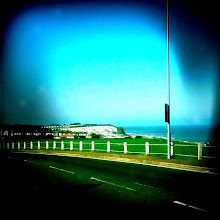Buried in Earlham cemetary, Norwich, is Jack Alby who passed away in June 1992. Jack was part of the Arlington Mummers and Folk Society, named after the area where they met, in and around the pubs of Unthank Road in the fifties and up until Jack's death, dissolving without it's colourful figure head to guide it. I'm sitting in the living room of Jack's house on the edge of the outer ring road with his wife Shirley, now 79. The house has photos of Jack dressed as a straw bear, holding a tankard aloft, surrounded by his fellow singers. A canary sings from another room as Shirley brings in a tray with tea and cups.
Norwich Psychogeographical Society: When did you meet Jack?
Shirley Alby: It was in 1951. I was working as a florist in Norwich, getting the train up from Diss everyday and my Father was a big folk singer. He took me along to the York tavern in Norwich one night to hear the Arlington Singers. I think me and Jack fell in love there and then. My father approved as Jack was so personable, you know, he could charm the devil into giving him a fiver and a lump of butter.
NPS: Can you remember any of the songs from that night?
SA: Yes, they sang one that has always stayed with me... (clears throat): Halantow / jolly rumbalow / we were up / long before the day-o / to welcome in the summer / to welcome in the meadow // Now summer is icumen in and winter's gone away-o. (Laughs). I have always loved that lilt on the welcome bits. It makes me smile something rotten! I can see 'im now, looking at 'is mates as they bellowed and held that note. It's funny y'know. How music can make you fall in love. It's a bit like magic I suppose, some sort of conjuring trick like them fellas on the telly, Jack was just beautiful there in the smoky upstairs room. Well we got married pretty quick, it was the Whitsun weekend and we 'ad our honeymoon in Whitby. We sang our way through a week of cuddling and a-cooing as honeymooners do.
NPS: Didn't Jack undertake some research into the origins of Babe s in the Wood?
SA: That he did. See, there's a wood out Watton way in Wayland, called of course, Wayland Woods. Now the locals see, they called it wailing wood on the fact that two little babes perished there, pushed into the trees by an uncle who wanted their inheritence. These tales are ten-a-penny across the land, but Jack, he just felt there was something in this, and did a bit of digging. He found buried in parish records the funeral of two small children, a boy and a girl who 'ad wandered away from the care of their guardian and were found painted by Jack Frost in the very same woods. Little Hugh and Mary Judd were their names. My Jack would tell the tale and then sing the song and the silence was something, I can tell you. He would say "this is to all them boys and girls of this world who we musn't forget" and you would see even the biggest fella well up. (Sings) pretty babe s in the wood / pretty babes in the wood / And when they were dead /The robin so red / Brought strawberry leaves / And over them spread.
SA looks out of the window.
...He's like a babe in the wood 'imself now. A lovely ship sailing the forest. (she smiles). He was good at that research lark, he put Alan Lomax onto a shanty singer called Harold Atlas over in Yarmouth who was a walking encyclopedia of shanty songs. He taught my Jack 'Polly on the Shore' which has a lovely melody. Nowadays these things are all over the computers aren't they, but before computers, before Lomax and Cecil Sharp, there was the oral tradition of exchanging songs, of passing on melodies like a game of chinese whispers. My Jack was part of that, the songs were alive for 'im. He felt like it was inviting a ghost to sing through him, he really did, that much more that having the eyes of your grandad or his old commode chair, you could feel him more through the songs he sang, as if the shape of the dead were foming in the air like breath. In them simple melodies you could hear the labour of the fields. You look now at harvest time and you'll see the machines running across East Anglia, and the fields barely alive with either bird or man, but in them songs, you felt that rural ghost touching your ear and blowing visions into your head, of hard lives spent at the harrow and the plough, and of unrest. I think that what my Jack bought to life, and nowadays we don't notice these things no more. I see the young people with their headphones in, tap-tapping away at their wireless phones, and I think to myself, who will hear them songs now? Who will care about the bird in the wood, or the wassail? I'm moaning now, pass us a biscuit duck.


No comments:
Post a Comment